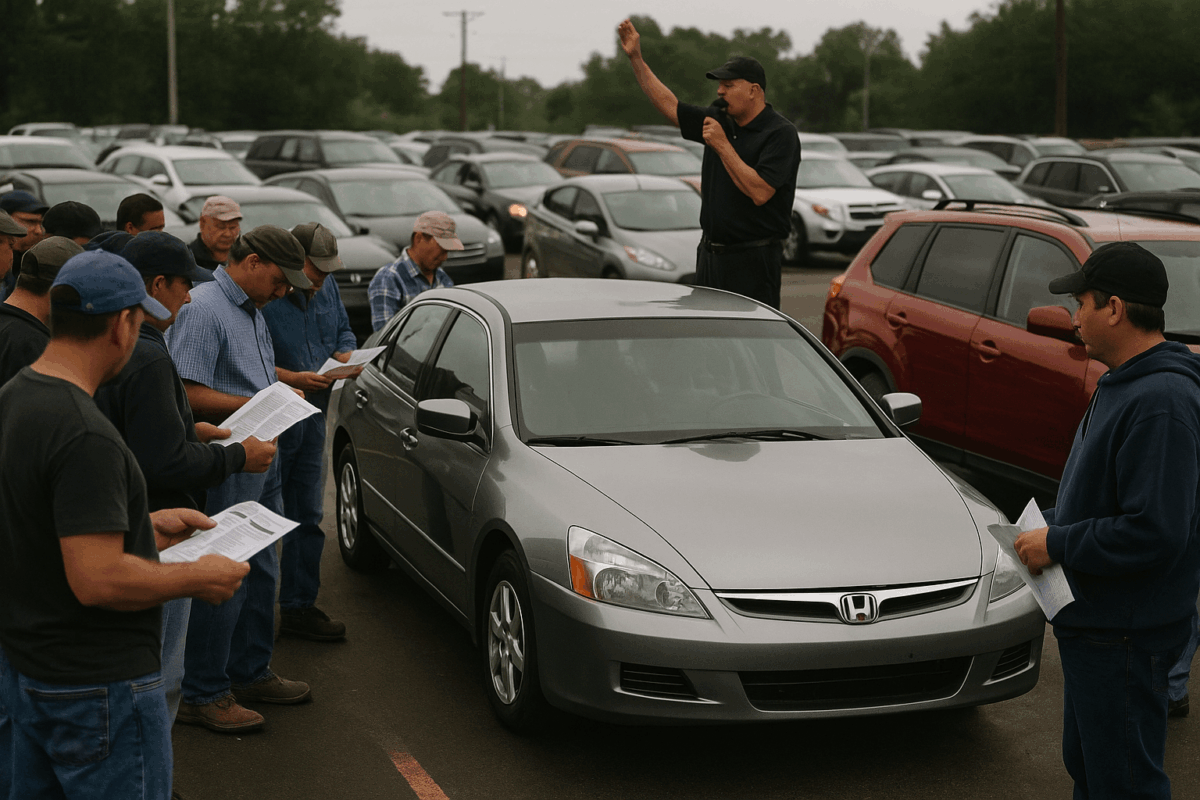Public auto auction Houston listings draw thousands of hopeful buyers. Everyone’s chasing a hidden gem. The idea of scoring a reliable car for half its retail price is undeniably exciting. Bidders line up early, catalogues in hand, scanning each lot for that rare used car with low mileage and no red flags. The thrill is real. One wave of the paddle, one winning bid, and you’re a vehicle owner.
But what starts as a dream can spiral into regret if you’re not prepared. Some cars hide serious issues under polished hoods. Others come with salvage title baggage or unresolved repair costs that only show up days later—after the engine stalls or the warning lights refuse to go off.
Unlike dealerships, there’s no one to guide you, no test drives, no guarantees. Each car is sold as is. You rely on your eyes, your instincts, and a tight grip on your maximum bid. Auctions don’t reward hesitation. Nor do they forgive ignorance.
So, are car auctions worth it? It depends on your knowledge, your budget, and your risk tolerance. In this guide, we’ll walk through the real pros and cons, what to watch out for, and how to navigate the world of auction vehicles like a seasoned pro.
What Are Car Auctions and How Do They Work?
Car auctions follow their own rhythm. Unlike traditional car buying, there’s no haggling with a salesperson, no leisurely browsing, and no second chances.
To participate, you must:
- Register before bidding begins
- Inspect the vehicle if allowed (note: usually no test drive)
- Bid during a fast-paced live or online sale
- Pay immediately after winning
- Accept the vehicle as is, without returns or guarantees
Vehicles may come from trade ins, repossessions, municipal impound lots, fleet liquidations, lease returns, or insurance company write-offs. Each unit is placed on the auction block with basic details like mileage, condition notes, and title status. Some auction houses offer vehicle history reports or VIN scans, while others provide minimal background info.
Whether you’re at a live auction site or browsing online, timing is everything. Once the bidding begins, hesitation can cost you the car—or save you from a bad deal. Knowing how the system works is critical to avoid missteps and make an informed purchase.
Public auto auction Houston is one such venue where buyers can access a wide variety of vehicles. These auctions cater to both individuals and dealers, allowing anyone with a valid registration to participate in the bidding process. The competition can be fierce, but with the right approach, you can score a great deal.

The Pros of Buying a Car at Auction
| Benefit | Description | Best For |
| Lower Prices | Bid starts below market value | Buyers looking to save money |
| Unique Inventory | Rare finds, exotics, off-lease cars | Collectors, flippers |
| Speed | Close a purchase in minutes | Urgent buyers |
| No Dealer Markup | Skip the car dealer | Private individuals |
| Public Access | Many auctions are open to all | Non-dealers |
The Cons of Car Auctions: What to Consider Before Bidding
Warning: Every auction block hides a surprise.
- As is sale—what you see is what you get
- No warranty or refund
- Risk of serious issues like engine failure or frame damage
- High buyer’s fees (5–10%)
- No test drive or long inspection
- Competitive, high pressure environment
Sometimes, that “deal” comes with thousands in repair costs.
Is It Really Cheaper to Buy a Car at an Auction?
On the surface, yes. But dig deeper.
Cost Breakdown:
- Winning bid
- Buyer’s fees (often 5–10%)
- Sales tax, registration
- Repairs—sometimes immediate, sometimes long-term
- Transportation if undrivable
Many assume auction vehicles automatically mean cars cheaper than anywhere else. But hidden costs creep in fast. A cracked windshield, failed emissions test, or bad brakes can tip the scale. The car may have been sold for a fraction of its market value, yet by the time you’re done fixing it, the total cost may match or exceed what you’d pay at local dealerships.
There’s also the time factor. Waiting on parts, scheduling service, arranging a tow—all add value drains. Factor everything. Only then can you truly judge if that car was a bargain or just cleverly disguised risk.

Tips for Buying a Car at Public Auto Auctions
Whether you’re at public auto auction Houston, or anywhere in the U.S., use these tips to ensure a successful purchase:
- Set a maximum bid. Stick to it, even when bidding gets intense.
- Run a vehicle history report. Check for accidents, title status, and past ownership.
- Bring a flashlight and OBD scanner. Inspect the car’s engine bay and electronics for hidden issues.
- Inspect title status. Watch for salvage title flags or liens.
- Note obvious damage and rust. Look under the car for signs of frame damage or rust that can’t be fixed easily.
- Watch other buyers bid to learn patterns. See what types of cars get higher bids and which ones attract less competition.
- Avoid your first emotional impulse—walk away if needed. If something doesn’t feel right, don’t chase it.
Being prepared and staying calm will help you walk away with a bargain instead of a bad deal.
How to Evaluate Cars at Auction and Avoid Hidden Problems
Before buying a car, spot danger signs:
- Check fluids and leaks
- Smell inside—mildew = flood damage
- Scan VIN for history and services
- Look for misaligned panels or spray-paint touch-ups
- Check tires for uneven wear
- Open trunk and engine bay
No thorough inspections = bad car risk.
When Are Car Auctions Not Worth It?
Don’t bid if you:
- Need financing
- Want a new car feel
- Expect guarantees
- Need specific trims or certain features
- Can’t afford costly repairs
- Dislike fast decisions
In those cases, stick to dealerships.
Can You Really Save Money at Auction?
Yes—if you play smart.
Bargain price wins happen:
- Compact with hail damage sells 40% under market value
- Trade ins with cosmetic issues go for pennies on the dollar
- Mechanics flip auction cars for profit
But one mistake—like buying a total loss vehicle—can eat your savings.
What to Expect at the Auction Site
Think less showroom, more factory floor.
- Rows of cars
- Staff shouting lot numbers
- Bidders with paddles
- No guidance, no time-outs
- Sales are fast. If you blink—it’s sold
Come prepared, or come later.
Understanding Titles: Clean, Rebuilt, Salvage
Each title tells a story:
- Clean: Never totaled
- Salvage title: Deemed unfixable once
- Rebuilt: Salvaged and repaired
- Lien: Still owned by lender
- Parts only: Not for road use
Ask about the title before bidding. Always.
What You Need to Bring to the Auction
Prepare like a pro:
- ID and bidder registration
- Proof of funds
- Smartphone with VIN checker
- OBD-II scanner
- Notepad for tracking inventory
- Mechanic (optional, smart)
Watch Out for These Common Mistakes
Avoid rookie errors:
- Skipping the preview
- Trusting cosmetic condition
- Overbidding out of ego
- Ignoring the as is label
- Forgetting additional fees
- Underestimating repair costs
Why Dealers Love Auctions—and You Can Too
Dealer auctions mean bigger margins. Why?
- Bulk buying
- Lower prices
- Private access
- Repeat services
- Fast turnaround
Public auctions now offer similar perks—without the license.
Your Vehicle May Need Immediate Repairs
Expect this:
- Battery dead
- Fluids low
- TPMS errors
- Tires balding
- Hidden damage underbody
It’s not uncommon for auction vehicles to require immediate attention. Even if the car looks good on the surface, serious issues may be lurking. If you’re not prepared for costly repairs or don’t have the time to fix these problems, it’s better to pass.
If you can’t fix fast—don’t buy.
Be Ready to Walk Away
The car isn’t right? Fee is too high? Smelled something off?
Walk. Away.
Even seasoned buyers exit empty-handed sometimes. It’s easy to get caught up in the excitement of bidding, but sometimes the best decision
Conclusion: Are Car Auctions Worth It for You?
If you crave speed, variety, and the thrill of bidding, yes—car auctions worth the effort.
But if you need support, time, and guarantees—maybe not.
Evaluate your risk tolerance. Do your thorough research. Set a budget. And when the right car at an auction rolls through?
Raise that paddle. Or wait for the next round.
FAQ
Q1. What are the main advantages of buying a car at an auction?
Access to a wide inventory, lower prices, and faster purchases than dealerships.
Q2. Are all cars at auctions in good condition?
No. Some have hidden damage or serious issues not visible during preview.
Q3. What is the typical auction fee, and how does it affect the price of the car?
Expect 5–10% added as buyer’s fees. Always include this in your cost estimate.
Q4. Can I get a warranty when buying from a car auction?
Almost never. All sales are as is.